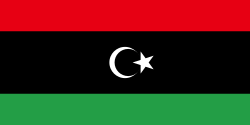No. Name Portrait Lifespan Reign Dynasty Reign start Reign end Duration 1 Idris I 1889–1983 24 December 1951 1 September 1969 17 years, 251 days Senussi The first and only King of Libya. Deposed in the 1969 revolution . [ 7] No. Name Portrait Lifespan Term of office Political affiliation Took office Left office Time in office 2 Muammar Gaddafi 1942–2011 1 September 1969 2 March 1977 7 years, 182 days Military / Arab Socialist Union Chairman of the Revolutionary Command Council (RCC). Gaddafi dissolved the RCC on 2 March 1977, after the General People's Congress (GPC) adopted the Declaration on the Establishment of the Authority of the People . [ 8] (2) Muammar Gaddafi 1942–2011 2 March 1977 2 March 1979 2 years Military / Independent (Islamic socialist ) Secretary-General of the GPC. Gaddafi renounced all government functions on 2 March 1979. However, as leader of the revolution (officially "Brotherly Leader and Guide of the Revolution "), he retained ultimate control over Libya until he was deposed and killed during the First Civil War in 2011. [ 9] [ 10] [ 11] 3 Abdul Ati al-Obeidi 1939–2023 2 March 1979 7 January 1981 1 year, 311 days Independent (Islamic socialist ) Secretary-General of the GPC. Previously served as Secretary-General of the General People's Committee (Prime Minister) , from 1977 to 1979. 4 Muhammad az-Zaruq Rajab born 1940 7 January 1981 15 February 1984 3 years, 39 days Independent (Islamic socialist ) Secretary-General of the GPC. Afterwards served as Secretary-General of the General People's Committee (Prime Minister) , from 1984 to 1986. 5 Mifta al-Usta Umar 1935–2010 15 February 1984 7 October 1990 6 years, 234 days Independent (Islamic socialist ) Secretary-General of the GPC. Served at the time of the 1986 United States bombing (Operation El Dorado Canyon ) . 6 Abdul Razzaq as-Sawsa 1933–2016 7 October 1990 18 January 1992 1 year, 103 days Independent (Islamic socialist ) Secretary-General of the GPC. 7 Muhammad az-Zanati 1937[ citation needed ] 18 January 1992 3 March 2008 16 years, 45 days Independent (Islamic socialist ) Secretary-General of the GPC. 8 Miftah Muhammed K'eba born 1947[ citation needed ] 3 March 2008 5 March 2009 1 year, 2 days Independent (Islamic socialist ) Secretary-General of the GPC. 9 Imbarek Shamekh born 1952 5 March 2009 [ 12] 26 January 2010 327 days Independent (Islamic socialist ) Secretary-General of the GPC. Previously served as Secretary-General of the General People's Committee (Prime Minister) , from 2000 to 2003. 10 Mohamed Abu al-Qasim al-Zwai born 1952 26 January 2010 [ 13] 23 August 2011 1 year, 209 days Independent (Islamic socialist ) Secretary-General of the GPC. Served at the time of the First Civil War and the concurrent foreign military intervention . Deposed during the Battle of Tripoli . 11 Mustafa Abdul Jalil born 1952 5 March 2011 8 August 2012 1 year, 156 days Independent Chairman of the National Transitional Council (NTC). In rebellion to 23 August 2011, based in Benghazi during this period. — Mohammed Ali Salim 1935–2022 8 August 2012 9 August 2012 1 day Independent Acting President of the General National Congress (GNC). Symbolic head of state for the handover of power from the NTC. 12 Mohammed Magariaf born 1940 9 August 2012 28 May 2013 292 days National Front Party President of the GNC. Resigned to comply with the Political Isolation Law passed by the GNC on 14 May 2013. — Giuma Ahmed Atigha born 1950 28 May 2013 25 June 2013 28 days Independent Acting President of the GNC. 13 Nouri Abusahmain born 1956 25 June 2013 5 April 2016 2 years, 285 days Independent President of the GNC. In rebellion, based in Tripoli . Internationally recognized until 4 August 2014. Following the 2014 parliamentary election , the government was split between the newly-elected House of Representatives (HoR) and the outgoing GNC, resulting in the Second Civil War . The 2014 elections were declared invalid by the Supreme Court in November 2014. [ 14] — Abu Bakr Baira born 1941 4 August 2014 5 August 2014 1 day Independent Acting President of the House of Representatives (HoR). Symbolic head of state for the handover of power from the GNC. 14 Aguila Saleh Issa born 1944 5 August 2014 15 March 2021 6 years, 222 days Independent President of the HoR. In rebellion, based in Tobruk . Internationally recognized until 12 March 2016. Following the inauguration of the Presidential Council and the Government of National Accord (GNA), the government remained split between the HoR and the National Salvation Government (NSG), recreated after the 2016 coup attempt . Afterwards, the High Council of the Revolution was created as well. However, the High Council of State (HCS), based in Tripoli, recognized the GNA. 15 Fayez al-Sarraj born 1960 30 March 2016 15 March 2021 4 years, 350 days Independent Chairman of the Presidential Council . Simultaneously served as Prime Minister of the Government of National Accord (GNA). Internationally recognized, based in Tripoli. 16 Mohamed al-Menfi born 1976 15 March 2021 Incumbent 4 years, 316 days Independent Chairman of the Presidential Council. Internationally recognized, based in Tripoli. 


















